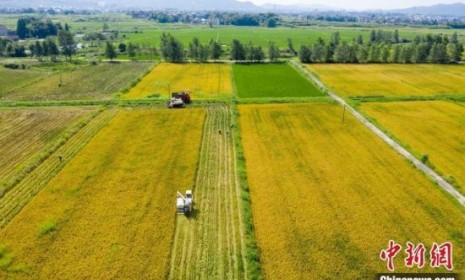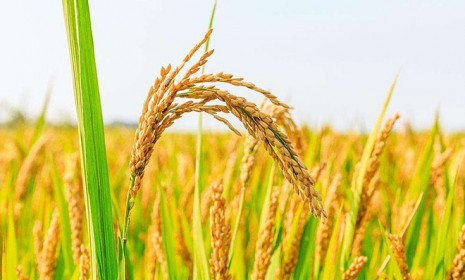GA-BnaRGA-BnaLEC1分子模块调控脂肪酸合成的通路模型
南湖新闻网讯 近日,华中农业大学油菜杂种优势利用课题组揭示了赤霉素通过 GA-BnaRGA-BnaLEC1 信号模块在种子发育特定阶段调控甘蓝型油菜种子脂肪酸生物合成中的作用,为植物激素调控脂肪酸生物合成提供了新颖的理解,同时也为高油油菜品种的选育提供了重要的理论依据。
甘蓝型油菜(Brassica napus)是目前世界上主要的油料作物之一。种子含油量和脂肪酸的组分决定了菜籽的品质和经济价值,提高种子含油量和改善脂肪酸组分是甘蓝型油菜遗传改良的重要目标。多年以来,随着油脂合成途径的解析,人们在高油油菜品种的培育上取得了很大的突破。然而,关于植物激素信号在调节甘蓝型油菜脂肪酸合成中的作用却鲜为人知。
DELLA蛋白是赤霉素信号通路的负调控因子,在植物生长发育的多个阶段均发挥着重要作用。该研究首先通过表达模式分析发现,甘蓝型油菜DELLA蛋白家族成员BnaRGAs的表达水平在种子发育过程中被显著抑制。进一步的研究表明,与野生型相比,BnaRGAs的两个功能获得型突变体bnaa6.rga-D和ds-3种子含油量显著降低,同时脂肪酸的组分也发生变化,油酸比例降低而亚油酸比例升高。相比之下,功能缺失的四突变体bnarga在种子发育早期含油量高于对照材料,同时油酸含量增加而亚油酸含量减少。多个编码脂肪酸合成酶基因的表达量在bnaa6.rga-D中显著降低,表明BnaRGAs负调控甘蓝型油菜脂肪酸合成。
蛋白水平的研究发现,BnaA6.RGA和BnaC7.RGA与种子脂肪酸合成正调控因子BnaLEC1存在蛋白互作。遗传实验证据表明,bnarga bnalec1六突变体种子脂肪酸组成与bnalec1双突变体间无显著差异,提示了BnaLEC1在脂肪酸合成中对BnaRGA存在上位性。此外,BnaA6.RGA抑制了由BnaLEC1介导的BnaABI3的转录激活,表明BnaRGA通过抑制BnaLEC1对脂肪酸合成基因的转录激活作用,进而抑制种子脂肪酸的合成。
该发现揭示了BnaRGA-BnaLEC1在种子含油量和脂肪酸的组分调控中的重要作用,为甘蓝型油菜中油脂含量的提高和脂肪酸组分的调节提供了十分重要的参考依据。该研究以“DELLA Proteins BnaA6.RGA and BnaC7.RGA negatively regulate fatty acid biosynthesis by interacting with BnaLEC1s in Brassica napus” 为题发表在在Plant Biotechnology Journal上。我校植物科学技术学院博士研究生闫冠博为该论文的第一作者,马朝芝教授和戴成副教授为论文的共同通讯作者。
【英文摘要】
Seed oil content (SOC) and fatty acid (FA) composition determine the quality and economic value of rapeseed (Brassica napus)。 Little is known about the role of gibberellic acid (GA) in regulating FA biosynthesis in B. napus. Here, we discovered that four BnaRGAs (B. napus REPRESSOR OF GA), encoding negative regulators of GA signalling, were suppressed during seed development. Compared to the wild type, SOC was reduced in gain‐of‐function mutants bnaa6.rga‐D and ds‐3, which also showed reduced oleic acid and increased linoleic acid contents. By contrast, the loss‐of‐function quadruple mutant bnarga displayed higher SOC during early seed development than the wild type, with increased oleic acid and reduced linoleic acid contents. Notably, only BnaA6.RGA and BnaC7.RGA physically interacted with two BnaLEC1s, which function as essential transcription factors in FA biosynthesis. The FA composition did not significantly differ between bnarga bnalec1 sextuple mutants and bnalec1, suggesting that BnaLEC1s are epistatic to BnaRGAs in the regulation of FA composition. Furthermore, BnaLEC1‐induced activation of BnaABI3 expression was repressed by BnaA6.RGA, indicating that GA triggers the degradation of BnaRGAs to relieve their repression of BnaLEC1s, thus promoting the transcription of downstream genes to facilitate oil biosynthesis. Therefore, we uncovered a developmental stage‐specific role of GA in regulating oil biosynthesis via the GA‐BnaRGA‐BnaLEC1 signalling cascade, providing a novel mechanistic understanding of how phytohormones regulate FA biosynthesis in seeds. BnaRGAs represent promising targets for oil crop improvement.
论文链接:https://onlinelibrary.wiley.com/doi/abs/10.1111/pbi.13628
日期:2021-05-18

















